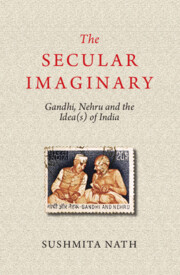Book contents
- Frontmatter
- Contents
- Preface
- Acknowledgements
- Introduction
- 1 Debating the Secular beyond the West
- 2 Gandhi’s Ashram and Political Thought: A Counter-narrative of Secularity
- 3 Gandhi’s Associationalism: A Non-state Alternative to Liberal Secularism?
- 4 Was Nehru Nehruvian? Religion, Secularity and Nehruism
- 5 Nehru and the Politics of Liberalism of Fear
- Conclusion
- Bibliography
- Index
Introduction
Published online by Cambridge University Press: 27 September 2022
- Frontmatter
- Contents
- Preface
- Acknowledgements
- Introduction
- 1 Debating the Secular beyond the West
- 2 Gandhi’s Ashram and Political Thought: A Counter-narrative of Secularity
- 3 Gandhi’s Associationalism: A Non-state Alternative to Liberal Secularism?
- 4 Was Nehru Nehruvian? Religion, Secularity and Nehruism
- 5 Nehru and the Politics of Liberalism of Fear
- Conclusion
- Bibliography
- Index
Summary
Despite the seeming inferiority present in its nomenclature, Indian Political Thought has largely worked itself out in its sociopolitical operation rather than in normative justification and conceptual clarification as found in Western Political Theory. That is why a study of the political in India is always a ‘thought’ and never the enviable cogent theory of the West. By considering what seems to be a weakness as a strength, in this book, I first take up the task of elaborating upon an Indian intellectual history of a so-called Western conception – secularity. Drawing on recent debates on secularity, I wish to address the problem of understanding histories or narratives of secularity in context. Conceptually, I broadly follow recent studies, which through the framework of ‘multiple secularities’ challenge the claim of cultural embeddedness and historical specificity of secularity. In this book, I understand secularity to connote a modern epistemological characterisation of the social world wherein religion and secular are distinguished in terms of conceptual distinctions as well as structural or institutional and symbolic forms of differentiation of social spheres. It is also a ‘historical category’ in so far as such distinctions and differentiations develop as a response to social change brought in by new or unique conditions created by modernity. Second, through the lens of secularity, I also undertake an exercise in an intellectual history of modern India's two leading political leaders – M. K. Gandhi, the leader of India's non-violent nationalism, and Jawaharlal Nehru, the first prime minister of independent India – whose thought and politics had a defining impact on the ‘idea of India’ as a multireligious nation-state. This book is thus an intellectual history of both idea(s) and intellectuals, which revisits the narrative of secularity in modern India. Lastly, as a self-avowed secular and democratic nation-state, post-colonial India faces challenges of majoritarianism and extremist Hindu nationalism, where we see a simultaneous rejection and appropriation of secularism in the political field. With the popularity and electoral success of right-wing Hindu nationalist groups challenging the ‘Gandhi–Nehru tradition’ of a nation built on the secular ideal, I revisit dominant narratives of secularity in the twentieth century, as exemplified in sarva dharma samabhava (equality of all religions) and unity in diversity, which in Indian politics today have been reduced to empty rhetoric.
- Type
- Chapter
- Information
- The Secular ImaginaryGandhi, Nehru and the Idea(s) of India, pp. 1 - 19Publisher: Cambridge University PressPrint publication year: 2022



